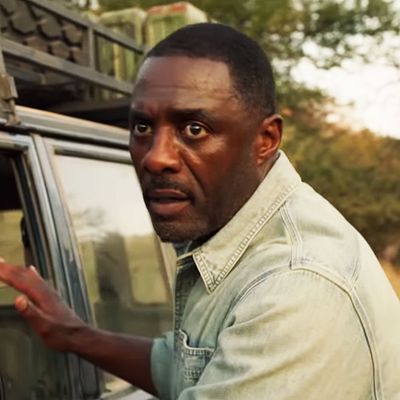
One of the keys to Idris Elba’s appeal is that he always looks as though he has something else on his mind. Not that he’s inattentive as an actor but that his characters are preoccupied — whatever situation they find themselves in, they often seem burdened by something greater. This makes for an intriguing star persona. It can encompass the scheming, charismatic Stringer Bell of The Wire or the deranged, ambitious Commandant of Beasts of No Nation. It is this quality of Elba’s that Icelandic director Baltasar Kormákur homes in on most effectively in the wildlife thriller Beast, which besides being a tight little creature feature also manages to be the story of a man learning to overcome his guilt and live in the present.
Elba plays Nate Samuels, a widowed doctor who is traveling with his two daughters, Norah (Leah Jeffries) and Meredith (Iyana Halley), to his recently deceased wife’s home village in South Africa when they are confronted and pursued by a lion whose pride has been wiped out by poachers. The lion has it out for all humans, and the fact that Nate and his kids are being accompanied by close family friend Martin (Sharlto Copley), a wildlife biologist who also works as an enforcer for the local nature preserve and sometimes even hunts poachers, makes no difference to the creature. (The filmmakers do take some care not to demonize lions in general. Early on, Martin brings the family to visit another pride, one he has helped raise, and we see that these animals, while enormously powerful, can also be playful. A lion might be the adversary in Beast, but the movie makes it abundantly clear that the poachers are the real villains.)
Kormákur stages the film as a series of suspenseful long takes that follow the characters while allowing us to see what’s happening behind and around them. Ordinarily, movies like this would utilize the magic of editing — cutaways, concealment, smash cuts, etc. — to build suspense. Kormákur, by contrast, uses fluidity: Our eyes drift along with the camera and the characters against ever-changing backgrounds. When the attacks do come, the camera swiftly spins around and shifts perspective so that we see just how incredibly, terrifyingly fast these lions can be. This relatively novel approach also lends the film a bracing unpredictability. Because the visual language feels so different from what we’re used to, we never quite know what’s coming next.
The thrills are solid, and the cast elevates the material further — particularly Elba, who, as noted earlier, seems to carry the weight of the world on his shoulders. Nate wants his daughters, particularly his youngest, to look up from their devices and experience the wonders of this place, but he himself is mired in grief and shame. Drowning his sorrows one night, he reveals to Martin that he and his wife had separated before she fell ill, and he blames himself for being too preoccupied with his patients to catch the cancer that entered his own house like a predator of a different kind. His daughters blame him, too, so the trip is not just a pilgrimage but also a retreat. Nate wants to use this opportunity to mend emotional fences with his girls, but he doesn’t quite know how. Of course, protecting them from a deranged lion might do the trick.
For all that, Beast knows not to overstay its welcome. At 93 minutes (including credits), it avoids too many cumbersome plot mechanics, the kind that might crowd our brains with questions of logic and character motivation. Yes, it’s all illogical and silly: Lions don’t behave this way, and humans tend to be better at self-preservation than such movies would have us believe. But if everybody always acted correctly, we wouldn’t have movies like Beast, and that’d be no fun at all.


